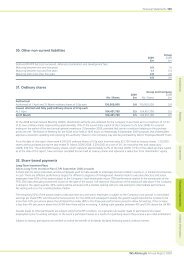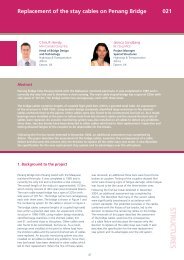View - Atkins
View - Atkins
View - Atkins
You also want an ePaper? Increase the reach of your titles
YUMPU automatically turns print PDFs into web optimized ePapers that Google loves.
Governance 57<br />
The targets against which bonuses are paid include challenging<br />
financial objectives and consideration of Group performance in<br />
respect of health and safety and staff retention. Executive directors<br />
will be eligible to receive a bonus of 90% of their basic salary for<br />
on-target performance for the year ended 31 March 2009. The<br />
committee intends to conduct a thorough review of remuneration<br />
during the current financial year to determine what changes, if<br />
any, should be made to both the levels and structure of the total<br />
reward package of each executive director. This will include a review<br />
of bonus arrangements, including the bonus cap of 100% of salary,<br />
to provide sufficient flexibility to reward exceptional performance.<br />
Executive directors are required to take one-third of any bonus in<br />
the form of an award over shares under the terms of the <strong>Atkins</strong><br />
Deferred Bonus Plan (DBP). The DBP is designed to aid retention,<br />
with the award being subject to forfeiture on resignation within<br />
three years of grant. There are no further performance conditions<br />
once the award has been made. Dividends declared on DBP<br />
awards are rolled up and delivered to participants in cash on<br />
release of the award to align their interests further with those<br />
of shareholders. Members of the Group Executive must also take<br />
one-third of any bonus they receive via an award made under the<br />
Retention Bonus Plan (RBP) which is similar to the DBP but which<br />
allows for a shorter vesting period of two years.<br />
Bonus awards are non-pensionable and non-contractual.<br />
The Company’s bonus and long-term incentive plans seek to<br />
provide executive directors and members of the Group Executive<br />
with the opportunity to increase overall remuneration levels to<br />
the upper quartile for comparable businesses but only following<br />
demanding performance targets being achieved.<br />
C. Long-term share incentives<br />
The <strong>Atkins</strong> Long Term Incentive Plan (LTIP) seeks to motivate and<br />
retain the executive directors, members of the Group Executive<br />
and other senior executives. Under the LTIP, awards to executive<br />
directors and members of the Group Executive are made on the<br />
following basis:<br />
• 50% of the award is subject to the Company’s total shareholder<br />
return (TSR) performance relative to the constituents of the<br />
FTSE 250 Index (excluding investment trusts) on the date of<br />
award. Full vesting is achieved if the Company ranks in the<br />
upper quartile, 30% for a median ranking, and pro rata vesting<br />
for intermediate performance. No vesting occurs for a ranking<br />
below median<br />
• 50% of the award is subject to the Company's real growth in<br />
normalised earnings per share (EPS) over the performance period.<br />
An increase in EPS of more than 10% per annum above the UK<br />
retail price index (RPI) over the three year performance period<br />
enables the shares to vest in full; an increase of 4% per annum<br />
above the UK RPI will result in 30% of the shares vesting; no<br />
shares vest for an increase of less than 4% per annum above<br />
the UK RPI. Pro rata vesting operates for growth in EPS between<br />
4% and 10% above the UK RPI.<br />
Awards made to other participants are subject solely to the<br />
EPS condition as set out above.<br />
Dividends declared on shares subject to LTIP awards are rolled<br />
up and delivered to executives in cash on release of the<br />
underlying award.<br />
The Committee believes that EPS growth provides a closer ‘line of<br />
sight’ between management performance and reward than can be<br />
achieved via TSR alone.<br />
This year the committee intends to make LTIP awards at around<br />
100% of salary to the executive directors. As in 2007, the number<br />
of shares subject to the awards will be based on a share price<br />
determined as of the beginning of the financial year prior to the<br />
award date, a practice which the committee intends to continue<br />
to follow in future years. The upper limit in the LTIP is 150%<br />
of salary.<br />
A full summary of the performance conditions attaching to<br />
existing share plan awards can be found in note 32 to the<br />
Financial Statements on page 105.<br />
The Group encourages share ownership by its executives, and<br />
executive directors are encouraged to hold shares in the Company<br />
(either directly or through the DBP) equivalent to the level of their<br />
annual basic salary, based on the value of such shares at the time<br />
of their acquisition (or award), or their current market value from<br />
time to time, whichever is the higher.<br />
D. All-employee share plan<br />
The Company’s Share Incentive Plan, as approved by HM Revenue<br />
and Customs, continues to be offered to all eligible UK employees,<br />
including the executive directors.<br />
E. Retirement benefits<br />
Pension and retirement benefits provided to the executive directors<br />
are comparable to those provided by other companies.<br />
Performance graph<br />
The Company’s performance, measured by TSR, is compared with<br />
the performance of the FTSE 250 Index (excluding investment<br />
trusts) over the past five years. This is considered the most<br />
appropriate index against which to measure performance as the<br />
Company has been a member of the FTSE 250 for the majority<br />
of the five year period.<br />
TSR performance over period 31.03.03 – 31.03.08<br />
1000<br />
800<br />
600<br />
400<br />
200<br />
0<br />
2003<br />
<strong>Atkins</strong><br />
FTSE 250<br />
2004 2005 2006 2007 2008<br />
TSR is defined as the return shareholders would receive if they held<br />
a notional number of shares and received dividends on those shares<br />
over a period of time. Assuming dividends are re-invested into the<br />
Company’s shares, it measures the percentage growth in the<br />
Company’s share price together with the value of any dividends paid.<br />
Introduction Reviews Governance Financial Statements Investor Information<br />
WS <strong>Atkins</strong> plc Annual Report 2008

















